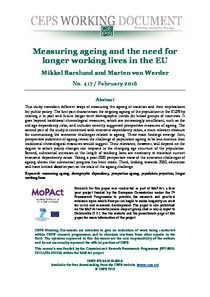Measuring ageing and the need for longer working lives in the EU

Barslund, Mikkel ; von Werder, Marten
European Centre for Political Studies, Brussels
CEPS - Brussels
2016
27 p.
ageing population ; demography ; government policy ; working life
CEPS Working Documents
417
Demography
English
Bibliogr.
"This study considers different ways of measuring the ageing of societies and their implications for public policy. The first part characterises the ongoing ageing of the population in the EU28 by relating it to past and future longer-term demographic trends for broad groups of countries. It goes beyond traditional chronological measures to include recently suggested prospective measures of ageing. The second part of the study is concerned with economic dependency ratios, which are a more relevant measure for summarising the economic challenges related to ageing. Three main findings emerge: first, prospective indicators of ageing reveal the challenge of population ageing to be less onerous than traditional chronological measures would suggest. Their relevance, however, will depend on the degree to which policy changes can respond to the changing age structure of the population. Second, substantial increases in the length of working lives are necessary to maintain current economic dependency ratios. Taking a year-2000 perspective on the economic challenges of ageing shows that substantial progress has been made. Third, looking towards 2050, education will have limited direct impact on the scale of the ageing challenge."
Digital
The ETUI is co-funded by the European Union. Views and opinions expressed are however those of the author(s) only and do not necessarily reflect those of the European Union or the ETUI.